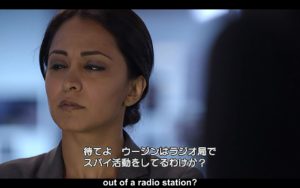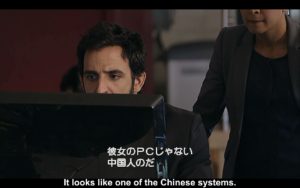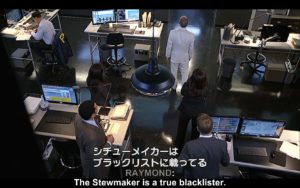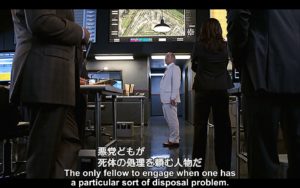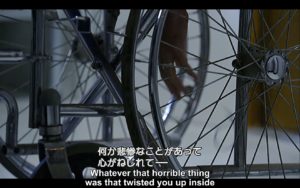「ブラックリスト」シーズン1の第3話、第4話の場面です。PotPlayerで英語字幕と日本語字幕を同時表示し、スクリーンショットをとりました。
(以下字幕)
You’re telling us that Wujing is running a spy ring out of a radio station?
待てよ ウージンはラジオ局でスパイ活動をしているわけか?
(字幕終わり)
out of a radio stationのout ofは、「本拠地として/拠点として」の意味です。out of Londonは「ロンドンを本拠地として」、out of homeは「自宅を本拠地として」、つまり「在宅勤務」です。辞書にはあまり出ておらず、間違いが多いようです。映画では、テレビの中継車の中でスパイ活動をしています。
次です。
(以下字幕)
Let’s roll. ETA, one minute.
行くぞ 1分後に作戦開始
(字幕終わり)
ETAは、Estimated Time of Arrivalの略語で「到着予定時刻」。字幕では「1分後に作戦開始」となっていますが、厳密には「1分後に現場に到着」です。
次です。
(以下字幕)
Uh, hang on, this isn’t her computer.
彼女のPCじゃない
It looks like one of the Chinese systems.
中国人のだ
(字幕終わり)
PCはpersonal computerの略語ですが、英語圏ではあまり見かけません。和製英語です。単にmy/your/her/his computerというのが普通です。また、上の場面のようにsystemも使います。
この場合、systemはher computerの言い換えですので、「システム」ではなく「コンピューター(PC)」と訳さなければなりません。英語では、日本語の感覚では病的と思えるほど同じ単語の繰り返しを嫌います。ノートパソコンもsystemといいます。
次です。
(以下字幕)
We asked Henry to use his access to get us the plans.
我々はヘンリーに青写真を入手させ
(字幕終わり)
accessは「アクセス権(近付いて入手する/入手して使用する権利・能力)」で、直訳は「ヘンリーに依頼し、(ヘンリーが)自分のアクセス権を使って、我々にプランを入手させる/我々がプランを入手できるようする」。plansは「設計図(平面図)」です。
次です。
(以下字幕)
As entertaining as all this has been, we really do need to leave now.
楽しい見世物だったが、帰らせてもらう
The next sound you hear is gonna be the FBI knocking on your door.
いつFBIが踏み込んでくるか分からんからな
(字幕終わり)
the FBI knocking on your doorは名詞構文といわれ、「動詞または形容詞が名詞化されて文に組み込まれた構文」です(江川泰一郎著「英文法解説改訂三版」より)。詳しくは、お手元の英文法書で調べてみてください。
次です。
(以下字幕)
I’m after the big game, Lizzy. The ones that matter.
私の狙いは大物 重要な犯罪者だ
(字幕終わり)
gameは、この場合、「猟の獲物(の肉);(追求・攻撃の)目標,対象」(ジーニアス)です。それにbigがついて「大きな獲物/大物」となります。gameには、「挑戦する気がある、やる気がある、乗り気な」という意味の形容詞もあります。次の英文が有名です。
I’m game if you are (game). あなたが乗り気なら私もやるよ。(「英辞郎」より)
次です。
(中略)
(以下字幕)
The Stewmaker is a true blacklister.
シチューメーカーはブラックリストに載っている
The only fellow to engage when one has a particular sort of disposal problem.
悪党どもが死体の処理を頼む人物だ
(中略)
I’m sure you promised him all sorts of protection to compel him to testify.
証言させるために 身の安全を保証したんだろ?
(字幕終わり)
sort(kind)の用法は複雑です。sort ofの次にaがあったりなかったり、sortsと複数形になったり(上記参照)、sortの前にtheが付いたり付かなかったり、名詞の後にof sortsの形で置かれたり、また、a particular sort ofという形があったり(上記参照)、等々。
Practical English Usage (Third Edition)に分かりやすい説明がありましたので引用します。引用文の著作権はPractical English Usageの著者が保有しています。()内は、参考訳です。参考訳の著作権は、訳者にあります。
(引用開始)
551 sort of, kind of and type of
1 articles
1冠詞
The article a/an is usually dropped after sort of, kind of and type of, but structures with articles are possible in an informal style.
参考訳:sort of、kind of、type ofのあとでは通常、不定冠詞(a/an)は省略するが、非公式(口語)では不定冠詞も可。
That’s a funny sort of (a) car.
What sort of (a) bird is that?
2 singular and plural; these sort of etc
2 単数・複数(these sort of など)
When we are talking about one sort of thing, we can use sort of, kind of or type of followed by a singular noun.
参考訳:1種類のものについて述べるとき、sort of、kind of、type ofのあとには単数形の名詞が来る(通常はa/anはなし、上記参照)。
This sort of car is enormously expensive to run.
I’m interested in any new type of development in computer science.
Singular sort of, kind of and type of can also be followed by plural nouns, especially in an informal style.
参考訳:sort of、kind of、type ofの単数形(複数のsなし)のあとには、複数形の名詞が来てもよい(とくに口語体)。
I’m interested in any new kind of developments …
Plural demonstratives (these and those) can also be used.
参考訳:sort of、kind of、type ofの前に指示代名詞の複数形(theseとthose)を使用することもできる。
These sort of cars are enormously expensive to run.
Do you smoke those kind of cigarettes?
This structure is often felt to be incorrect, and is usually avoided in a formal style. This can be done by using a singular noun (see above), by using plural sorts/kinds/types, or by using the structure … of this/that sort/kind/type.
参考訳:ただし、上記の用法は誤りと考えられることも多く、正式の文では通常は使われない。したがって、上記の用法はやめて通常のように単数名詞を使うか(This sort of car is…)、または、sort、kind、typeの複数形(sorts、kinds、types)を使用するか(These kinds of car(s) are…)、もしくは、of this/that sort/kind/typeの形を用いる(Cars of that type are…)。
This sort of car is…
These kinds of car(s) are… Cars of that type are…
3 softeners
3 ソフトナー
In an informal style, sort of and kind of can be used before almost any word or expression, or at the end of a sentence, to show that we are not speaking very exactly, or to make what we say less definite.
参考訳:sort ofとkind ofは、非公式(口語)ではほとんどの単語や語句の前、または文の末尾で使うことができ、この用法により、表現がそれほど厳密ではないこと、または断定の度合いが比較的低いことを示すことができる。
We sort of thought you might forget.
Sometimes I sort of wonder whether I shouldn’t sort of get a job.
I’ve had sort of an idea about what we could do.
She’s kind of strange. I’ve changed my mind, kind of.
(引用終わり)
a particular sort ofは、必ずといっていいほどaが付きます。一方、a part ofはaが落ちることも多いようです。 all sorts (kinds) of のあとには複数名詞が付きます。ただし、不可算名詞は除きます(上記のprotection)。
次です。
(以下字幕)
I think you’re trying to dissolve something else. Your past maybe?
消そうとしているのは多分 過去ね
Whatever that horrible thing was that twisted you up inside and made you into the freak that you are!
何か悲惨なことがあって 心がねじれて 化け物になったのよ
(字幕終わり)
Whatever~の文は複雑です。that horrible thingは「その(過去の)恐ろしい出来事」で、thatは「その出来事」。したがって、直訳は、「その恐ろしい出来事が何かは分からないが、(とにかく)その出来事が、あなたを内面的に曲げて/ゆがめて、その結果、あなたは現在のあなたのような怪物になった」。
以上

